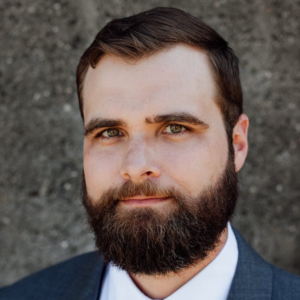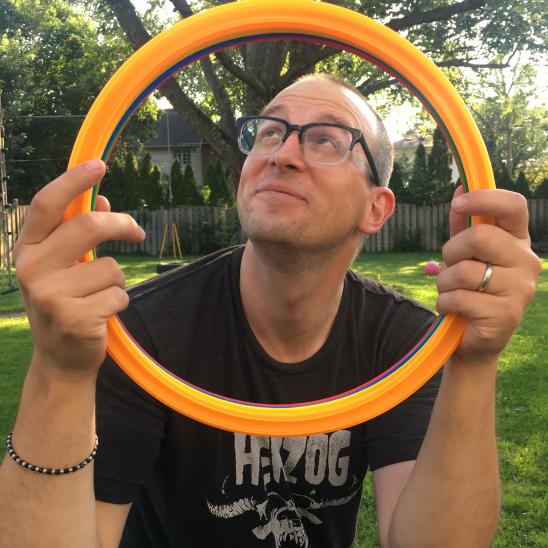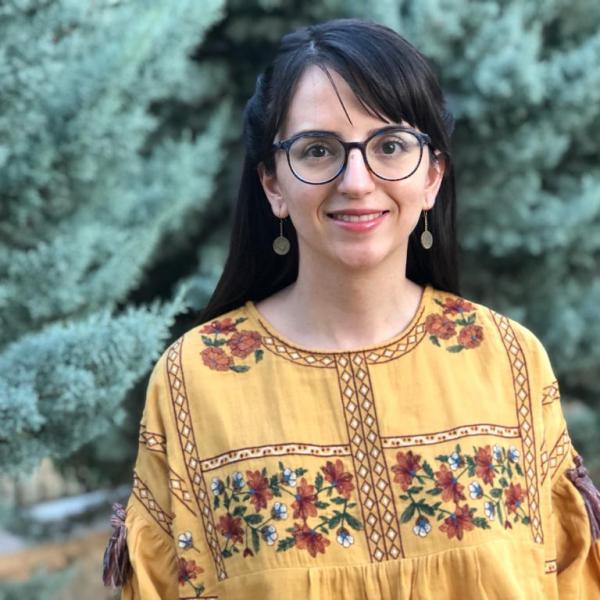
Mehrnoush Soroush
Director of CAMEL Lab and Assistant Professor in Ancient Near Eastern Studies
Mehrnoush’s research focuses on the resilience of ancient cities in adapting to environmental changes and socio-political developments by adopting new hydraulic strategies and technologies. She employs interdisciplinary approaches drawing on a broad set of data, including archaeological fieldwork, textual and archival research, Geographic Information Systems (GIS), remote sensing, and related computational methods.

Dominik Lukas
Lab Manager, PhD Candidate in the Department of Anthropology
Dominik Lukas is a researcher on the development of field-recording databases for social sciences, archaeology, and cultural heritage, particularly interested in the role these systems play in producing scientific knowledge. After earning his MA in prehistoric archaeology at the University of Leipzig (Germany), he worked at the German Archaeological Institute (DAI) and the Excellence Cluster Topoi in Berlin (Germany) as well as the Çatalhöyük Research Project at Stanford University. Since 2019, he has been a Doctoral Student at the Department of Anthropology.
At CAMEL, Dominik is tasked with managing the Lab and lending general support in all aspects of computational methods in research.

Harrison Morin
Research Assistant, Graduate Student in MES
Harrison Morin is a Ph.D. student in Middle Eastern Studies. His research focuses on the archaeological landscapes of Central Asia during the Kushan period and explores questions related to settlement patterning, mobility, urbanism, and empire. He holds an MA in Anthropology from the University of Chicago’s Master’s Program in the Social Sciences and a BA in International Relations and History from Saint Anselm College.
Harrison has been a member of the CAMEL Lab since 2019, where he started working as a research assistant for the Afghan Heritage Mapping Partnership. His current responsibilities at the lab include managing and coordinating data procurement requests and overseeing and administering all Afghanistan and AHMP-data-related requests and proposals.

Çağlayan Bal
Research Assistant, Graduate Student in MES
Çağlayan Bal is a PhD student in Middle Eastern Studies, specializing in Anatolian archaeology. Her research interests include understanding Iron Age identities in central Anatolia.
She holds a BSc in Environmental Engineering from Middle East Technical University (METU, Turkey), a BA in Protohistory and Near Eastern Archaeology from Ankara University (Turkey), and an MSc in Settlement Archaeology from METU. She has participated in several excavation and survey projects in Turkey and is currently part of the Türkmenkarahöyük Archaeological Project (TKAP) in Konya, Turkey.
At CAMEL Çağlayan is involved in public outreach event collaborations with ISAC, the 2024-2025 CAMEL fellowship program, and the deep learning project.

Christian Borgen
Research Assistant, Graduate Student in MES
Christian is a PhD student in the Cuneiform Studies program of the Department of Middle Eastern Studies focusing on the socioeconomic history and geography of ancient Mesopotamia. His current research focuses on the analysis of administrative archives to explore the development of hired labor. He received his BA in Classical Studies and Philosophy from the University of Minnesota and his MA in Middle Eastern Studies from UChicago’s Center for Middle Eastern Studies. Christian has experience with excavation and survey projects in Israel and Iraqi Kurdistan.
At CAMEL, Christian manages the map collection and database along with facilitating data requests.

Yuwei Zhou
Research Assistant, PhD Candidate in EALC
Yuwei Zhou is a PhD candidate in East Asian Languages and Civilizations at the University of Chicago, specializing in Bronze Age Chinese archaeology and paleography. Her research uses geospatial and statistical tools to study the landscape of the Chinese Central Plain during the first and second millennium BC. She holds an MA in EALC from the University of Chicago (2023) and a BA in History and a BS in Mathematics-Computer Science from UC San Diego (2020).
Joining CAMEL in 2022, she initially worked with the Afghan Heritage Mapping Partnership and now oversees the AI-Assisted Archaeological Remains Detection (A3RD) project.

Joseph Harris
Research Assistant, Graduate Student in NELC
Joseph Harris is a PhD student in MES in the Archaeology of the Ancient Near East program. He researches the archaeology of the Late Prehistoric Near East, focusing on Pleistocene-Holocene transitional cultures and the Kurdistan region.
Joseph completed his B.A. at UNC Chapel Hill and afterwards spent an Affiliate year at University College London’s Institute of Archaeology. He has worked on several archaeological projects, including in Iraqi Kurdistan, Oman, Turkey, Jordan, Israel, Greece, and North Carolina.
Joseph’s interests in landscape archaeology concern strategies of mobility and sedentism, cross-community congregation, and networks of exchange in the Epipaleolithic and Early Neolithic.

Jiayue Wang
Research Assistant, Undergraduate Student
Jiayue Wang is a third-year undergrad. She specializes in ArcGIS and QGIS data processing and interpretation. She has done archaeological excavations in Spain and artifact analysis in China. Her interests include archaeology and computer science. Her study focuses on deep learning models for site suitability. Jiayue can study and digitize historical and archive data.
Her main CAMEL lab project is the Anatolian Atlas. This research analyses the Anatolian region using archaeological and topographical data from several surveys in a GIS database. She also collaborates with A3RD (AI-Assisted Archaeological Remains Detection), which uses machine learning algorithms to automatically identify archaeological sites.

Ruijie Yao
Research Assistant, Graduate Student
Ruijie Yao is a student research assistant in the CAMEL lab. He received his B.A. with honors in Anthropology (Archaeology track) from the University of Arizona in 2021 and an M.A. in Middle Eastern Studies (Egyptology track) in 2024 from the University of Chicago. His research interests include archaeological theories, remote sensing technique, ancient international relations in Second Intermediate Period and New Kingdom Period’s Egypt, and foreign language influence in the Egyptian language. He has multiple excavation experiences in the American Southwest, China, and Israel. At CAMEL lab, Ruijie works on the acquisition of U-2 historical imageries in the Iran region, BTAA data management, and the Oman survey project.

Olivia Fiser
Research Assistant, Graduate Student
Olivia is a master’s student in MAPH studying the connection between trade and personal identity during the Epipaleolithic period in the ancient Near East. Her current interests align with recognizing personhood for ancient people and learning the different ways individuality is expressed through traded goods. She received a B.A. in Anthropology and a B.A. In History from North Carolina State University. She has excavation and surveying experience in Cyprus and the southern United States.
At CAMEL, Olivia assists with the map collection and database and the current georeferencing project.

Julian Skye McCoy
Research Assistant, Graduate Student
Julian is an MA student in Anthropology in the University of Chicago’s Master’s Program in the Social Sciences. He holds a BA in Classics and Environmental Science from Northwestern University and a post-baccalaureate certificate in classical languages from Loyola University Chicago. His research interests include osteoarchaeology, archaeometallurgy, deindustrialization, and Etruscan and Roman mortuary landscapes. He has previously worked as a GIS consultant and has experience with excavation, survey, and photogrammetry projects in Italy.
Collaborators
Emad Khazraee
Vice President of Data Science and AI at Xometry

Rémi Cresson
Master of Engineering at the French National Institute for Agriculture, Food, and Environment (INRAE)
Rémi Cresson is a Research Engineer with the French National Research Institute for Agriculture, Food and Environment (INRAE). His research and engineering fields include remote sensing images processing at scale, high performance computing, machine learning, and geospatial data interoperability. An open-source software enthusiast, he is a member of the Orfeo ToolBox (OTB) Project Steering Committee and charter member of The Open Source Geospatial Foundation (OSGeo).
Parmanand Sinha
Computational Scientist, Research Computing Center (RCC)
Parmanand Sinha is an HPC Scientist at the University of Chicago’s Resource Computing Center. With more than a decade of experience in scientific computing and geospatial technologies, he specializes in designing and optimizing HPC workflows for data science, deep learning, and advanced geospatial analytics. He manages cloud infrastructures, implements robust security protocols and develops scalable backend systems, creating versatile web applications that meet diverse organizational needs.
Parmanand leads workshops on geospatial deep learning and spatial analysis. He holds a Bachelor’s degree from the Indian Institute of Technology, Roorkee, a Ph.D. in Geospatial Information Sciences from the University of Texas at Dallas, and completed postdoctoral research at the University of Tennessee, Knoxville, and the University of Louisville.

Andrew Wilson
Professor of the Archaeology of the Roman Empire, University of Oxford
Andrew Wilson is Professor of the Archaeology of the Roman Empire, University of Oxford. His research interests include the economy of the Roman empire, ancient technology, ancient water supply and usage, the history and archaeology of qanats, Roman North Africa, and archaeological field survey. Recent publications include: Coin Hoards and Hoarding in the Roman World (ed. with Jerome Mairat and Chris Howgego, Oxford, 2022), Simulating Roman Economies: Theories, Methods, and Computational Models (ed. with Tom Brughmans, Oxford, 2022), The Economy of Roman Religion (ed. with Nicholas Ray and Angela Trentacoste, Oxford, 2023); The Place of Palms: An Urban Park at Aphrodisias. Results of The Mica and Ahmet Ertegün South Agora Pool Project (with Ben Russell, Wiesbaden 2024).

Bijan Rouhani
Senior Researcher at the School of Archaeology, University of Oxford
Dr Bijan Rouhani is Senior Researcher at the School of Archaeology, University of Oxford, and the Deputy Director of the Endangered Archaeology in the Middle East and North Africa (EAMENA) project. He holds a PhD in the History and Conservation of Architectural Heritage from the University of Rome, La Sapienza. His research focuses on the conservation and protection of built heritage, risk management for heritage sites, post-conflict reconstruction, and the application of new technologies and remote sensing for heritage documentation and preservation. Rouhani is Chair of the Cultural Emergency Response (CER) Board, Vice-President of the International Scientific Committee on Risk Preparedness (ICORP) of the International Council on Monuments and Sites (ICOMOS), a member of UK Blue Shield, and Co-Founder of the Endangered Cultural Heritage of the Global South Hub at Oxford. He is an editor of Managing Disaster Risks to Cultural Heritage: From Risk Preparedness to Recovery for Immovable Heritage (Routledge 2024).

Nick Ross
Data Science Clinic Director, Data Science Institute
Dr. Ross is an experienced data science executive and academic leader who specializes in leveraging business, engineering, and data to optimize decision-making. His various roles have ranged from architecting and designing production ML/AI systems, to hiring, growing, and leading engineering and data science teams. He led the data science and backend engineering efforts at The Meta, an esports training platform used by millions of competitive gamers. Before joining The Meta, Dr. Ross was a Professor of Data Science at the University of San Francisco, where his research focused on how to effectively use data and data science techniques to answer business questions. As a consultant, he spearheaded data efforts at leading tech companies in the video and online game industry, from early-stage startups to multinational companies.
Dr. Ross received his PhD from UCLA, his Masters from UC Davis, and his Bachelor of Science from UC Berkeley. He has published papers in a variety of journals as well as given talks in both academic and industry settings.

 Mehrnoush
Mehrnoush Dominik
Dominik Çağlayan
Çağlayan Yuwei
Yuwei Ruijie
Ruijie